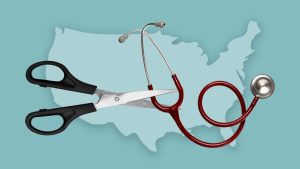Ellen Allen: The quiet repeal of affordable health care (Opinion)
Originally published October 3, 2025 in the Charleston Gazette-Mail.
For years, Republicans in Congress have worked to dismantle the Affordable Care Act. That’s not political or partisan — it’s a fact.
Sen. Shelley Moore Capito, R-W.Va., while serving in the U.S. House of Representatives, voted
several times to repeal the ACA. The exact number of votes is difficult to pinpoint, as the House held dozens of votes to dismantle or modify the ACA during her tenure.
After being elected to the Senate, Capito voted in 2015 for the Restoring Americans’ Healthcare Freedom Reconciliation Act, which sought to repeal the ACA. Later in 2017, she voted for the “skinny repeal,” a narrower bill to partially repeal the ACA.
Today, those efforts are no longer just talking points. Cuts to Medicaid, the expiration of ACA
premium subsidies and new barriers to coverage are all part of a quiet repeal strategy.
Congressional leaders aren’t calling it “repeal” anymore. Instead, they frame it as “letting
subsidies expire” or “state flexibility” or “eliminating waste, fraud and abuse.” But the effect is
the same: dismantling affordable coverage. And by tying these changes to budget fights, they
have now left our health care hostage to a government shutdown.
In West Virginia, more than 67,000 people buy coverage on the ACA marketplace. Without subsidies, premiums could more than double, and thousands will be priced out of coverage
all together. Meanwhile, Medicaid cuts will threaten the health care lifeline for 1 in 4 West
Virginians.
Now, the government shutdown makes a fragile system even weaker. Agencies that administer benefits and oversee programs could slow or even stop. Hospitals and clinics already on the edge face delays in payments. Families waiting for eligibility decisions are left in limbo. And while Washington argues, rural providers in counties like Logan, Boone, Barbour, and McDowell shoulder the burden.
Ask yourself: What happens when subsidies collapse and Medicaid shrinks? The answer: Regional hospitals lose reimbursements and must cut back, free clinics see a flood of uninsured people they can’t absorb, working parents drop coverage for their child to afford groceries, and your neighbor halts treatment for diabetes or heart disease.
The research is undeniable: When parents have access to affordable, stable health coverage,
their children are far more likely to be insured, and Medicaid expansion under the ACA
demonstrated this impact by not only extending coverage to more parents but also driving a
decline in the uninsured rate among children.
What we are witnessing is repeal in slow motion. Instead of a single vote, coverage is
dismantled in stages — subsidy cuts at the end of this year, Medicaid cuts and restrictions
after the mid-term elections next year, and program delays now worsened by the shutdown.
Washington avoids the word “repeal,” but the results are unmistakable.
To West Virginians, this isn’t a partisan fight or a Washington drama. It’s about whether
families can keep their kids insured, whether patients can get treatment without going
bankrupt, whether hospitals can keep their doors open.
Capito has long been a champion and advocate for funding the Children’s Health Insurance
Program, and that’s why it is so hard to understand how she can consistently support efforts
to dismantle the ACA and support the largest cuts in history to Medicaid and rural hospitals.
When your elected officials vote to take away your coverage — silently, steadily, through
procedural maneuvers — that is not “responsible governing.” It’s dismantling a social
guarantee one clause at a time.
If political leaders choose to force West Virginians into higher costs, less access and more fear, let them own it. We should call that what it is: a repeal by stealth.
We cannot allow health care to be dismantled quietly, or to be held hostage to shutdown brinkmanship. The people of West Virginia deserve stability, accountability and the assurance
that their health is not a bargaining chip in Washington.
West Virginians don’t get mulligans on their health care. We must protect what we have — because, once it’s gone, it won’t come back easily.

